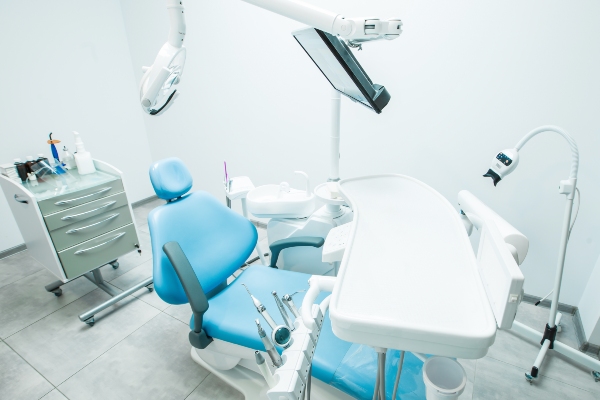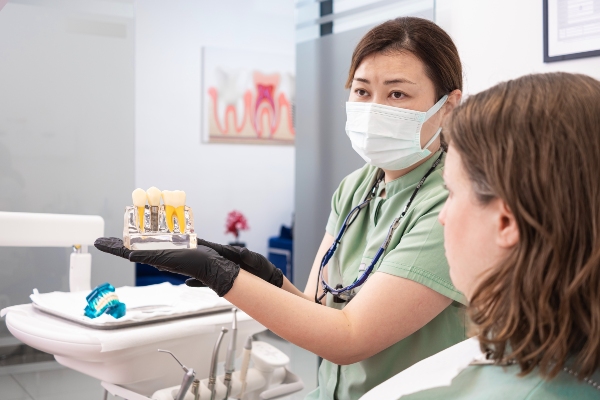 Restorative treatments encompass a broad range of dental procedures designed to help patients recover oral health and self-esteem via improved aesthetics. Patients who have suffered oral damage due to tooth decay, gum disease, or trauma might benefit from restorative therapy. Visiting the emergency dentistry office as soon as possible is advisable to restore oral health function and appearance.
Restorative treatments encompass a broad range of dental procedures designed to help patients recover oral health and self-esteem via improved aesthetics. Patients who have suffered oral damage due to tooth decay, gum disease, or trauma might benefit from restorative therapy. Visiting the emergency dentistry office as soon as possible is advisable to restore oral health function and appearance.
Restorative treatment options
The dentist will first examine the condition of the patient's teeth and gums to formulate a treatment plan that is specific to their requirements. The following are restorative treatments that the emergency dentistry office might recommend:
Dental fillings
One of the most frequent types of restorative treatment is dental fillings, used to repair teeth damaged by decay or cavities. Fillers are made from various materials based on the damage's severity, the cavity's location, and the patient's oral health in general. Dental fillings include porcelain, gold amalgam, glass ionomer cement, and composite resin. Having a cavity checked out as soon as possible is crucial before it becomes a dental emergency. Without prompt treatment, cavities may worsen to the point where extraction is the only option for saving the tooth.
Inlays and onlays
Restorations such as dental inlays and onlays may enhance the form and function of the teeth. Dental inlays treat decayed or broken portions of teeth that are too big for fillings but too little for crowns. Dental onlays are the same; they only go on the tooth's biting side instead. They are used to repair teeth that have been broken or decaying and may be fabricated from gold, porcelain, composite resin, or another tooth-colored material.
Lab-created crowns
Crowns fabricated in a dental laboratory fix cracked, chipped, broken, or decayed teeth by completely encasing the tooth above and below the gum line. A dentist manufactures crowns in a modern dental laboratory. The dentist will start the crown procedure by preparing the teeth by trimming and contouring the enamel and removing any decay. Next, the dental lab will use the digital impressions of the teeth to crease the natural-looking crown.
Patients will get a temporary crown while the dentist fabricates their permanent crown in the lab. It takes about a week to get the finished product. Then, the dentist will inspect the crown's fit and quality one more time before permanently cementing it to ensure the patient's new smile is functional and aesthetically pleasing.
Root canal therapy
When a tooth's pulp becomes infected or damaged, the dentist will perform a root canal as a restorative dental treatment. Although a dentist often performs the operation on the molars and premolars, they can perform root canal therapy on any tooth.
During root canal treatment, the pulp of the infected tooth is cleaned out and filled in (usually a material called gutta-percha). Besides halting further infection spread, this procedure may help forestall other issues like preventing more invasive operations like tooth extraction or replacement. In addition, dental crowns are often placed over infected teeth to prevent further damage.
Final note
A dental emergency is any situation involving the patient's mouth that needs professional medical care and cannot be handled at home. Constant pain in the mouth, dental problems including loose fillings and cracked teeth, and bleeding gums are all reasons to visit the emergency dentistry office for restorative treatment. If you are unsure whether what you are going through is an emergency, an emergency dentist should assess your situation and condition.
Request an appointment or call Diamond Head Dental Care at 808-450-2101 for an appointment in our Honolulu office.
Recent Posts
An emergency dentist provides urgent care for individuals experiencing sudden dental issues that require immediate attention. Understanding what qualifies as a dental emergency can help patients determine when to seek professional help. While some dental problems may seem urgent, others can be addressed with routine care. Whether due to a sudden injury, severe pain, or…
While patients can receive the immediate care they need during a dental emergency, they may still struggle with stress and some pain following the appointment. Thus, you need to follow specific guidelines from the emergency dentist to boost your recovery. One of the most important aspects is following specific dietary restrictions to prevent potential complications…
An emergency dentist frequently observes patients arriving with serious dental pain or infections that develop when consistent oral care and timely checkups are overlooked. Following a few simple yet effective preventative strategies makes many urgent dental problems less likely to occur. Here are three oral hygiene tips that help protect teeth and gums, reducing the…


